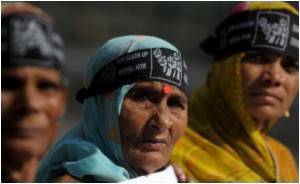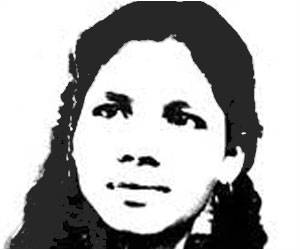Santhara is the Jain religious ritual of voluntary death by fasting, faces court test.

Lawyer Nikhil Soni approached the high court in the northern state of Rajasthan calling for a ban on santhara in 2006, describing the practice as unconstitutional and immoral.
Although fasting is a part of Indian culture, made famous by independence leader Mahatma Gandhi, who took up hunger strikes in protest against British rule, laws do not permit euthanasia or suicide.
But santhara has evaded legal intervention so far for being a religious custom dating back thousands of years.
Jains practise a strict pacifist creed, eating only selected vegetables, and taking care not to harm any living creatures.
Some wear masks across their mouths to avoid accidentally inhaling insects, and among devout Jains taking up santhara is held in high esteem.
Advertisements
More recently Vinoba Bhave, a community leader often seen as Gandhi's spiritual successor, practised santhara during his final days in November 1982.
Advertisements
Recalling her grandmother-in-law's last days, Ankur Surana said her death was seen as "a religious achievement".
"She was semi-conscious, surrounded by religious-minded people, who sang to her and performed ceremonies in her honour. There was no mourning.
"Her body was carried in a huge procession with all the women wearing red instead of the customary white worn at funerals. We were told to celebrate her passing, not grieve it."
But Soni, who is seeking to have santhara terminated, called it "a cold-blooded practice."
"There is no right to death in the constitution," he said. "Anyone who assists in santhara is actually assisting in an act of murder."
Soni compared santhara to the outlawed Hindu custom of sati when widows would fling themselves on their husband's funeral pyres and burn to death.
"That used to be justified like this, as a religious procedure and a means to attaining sainthood," he said. "Santhara has become a way for families to avoid taking care of the aged, and win some religious prestige along the way."
Those about to undergo santhara often make a public declaration of their intent by printing announcements in the local press and their families open their homes to visitors and religious figures wishing to pay tribute.
Many Jains insist that any ban would violate their religious rights.
Politicians in Rajasthan, where Soni's case is being fought, are reluctant to enter the fray, with one MP from the state, Arjun Ram Meghwal telling AFP, "santhara is a religious matter, government has no role to play in it."
As Soni waits for the final hearing date to be announced shortly, he said he hoped the verdict would show that "nothing, no religion gives a person the right to end their life."
But Surana has come to accept how her grandmother-in-law chose to die.
"We never wanted her to do this, but she was such a stubborn person and so religious, that there was no point arguing with her," she said.
"We had to accept the fact that she did not want to live any longer."
Source-AFP









